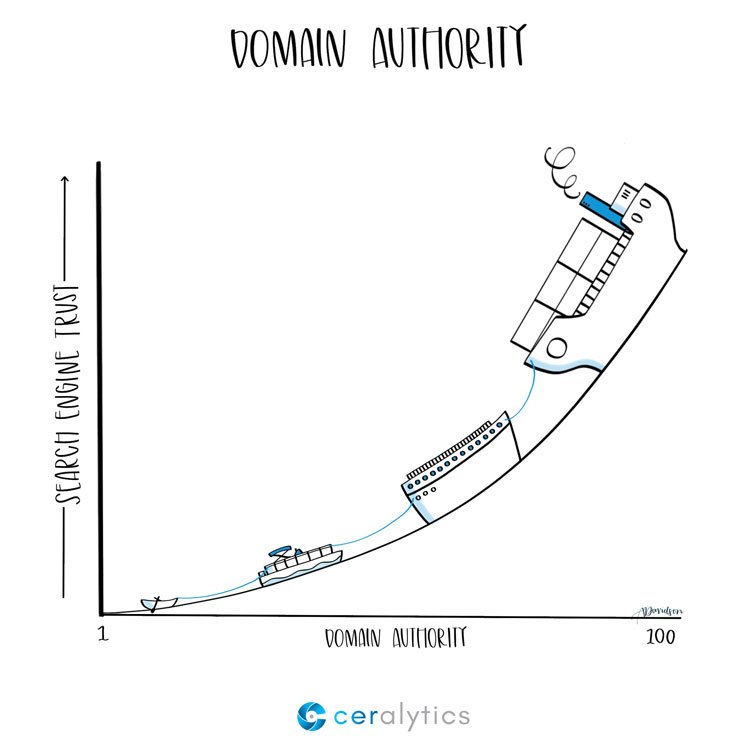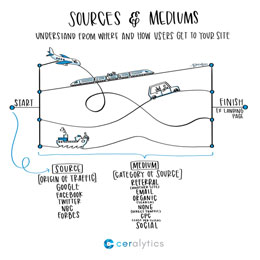Search engines have a tough job. There are trillions of website domains and subdomains floating around the Internet. How do search engines know which sites have good content to serve up to searchers and which are junk?
One metric they utilize is known as Domain Authority.
Your website domain is a vessel that carries all of your onsite content. Your Domain Authority is a measurement of your website’s overall trust and authority with search engines on a scale of 1 to 100. It was developed into this 1-100 scale by the folks over at Moz, and we at Ceralytics use the metric to benchmark competitor websites to one another.
Your Domain Authority is a HUGE ranking factor for search engines, so let’s explore what it is and how to increase it.
What does Domain Authority mean?
The higher your website’s Domain Authority, the more pull your website has with search engines in getting content on your site ranked higher.
For example, if you search for just about any noun in the English language, one of the top results will be a link to Wikipedia.org. This is because Wikipedia.org has a Domain Authority of 91, which is incredibly high.
Because of this high Domain Authority, just about anything posted on Wikipedia.org will get ranked highly in search engines for the term that the post is about.
Sway to that logarithmic beat
Domain Authority is based on a logarithmic scale, meaning that going from a Domain Authority of 10 to 15 is orders of magnitude easier than going from 70 to 75.
If your site’s Domain Authority is currently under 30, you’ll notice that it only takes a few great links to move the needle up to 31 and 32. However, as your Domain Authority increases, you will be climbing a steeper hill. It will take a lot more effort to move up into the 40’s, 50’s and 60’s.
Benchmarking your site vs. your competition
Domain Authority is a good way to quickly benchmark your site vs. your competition. Sites with higher Domain Authorities have more credibility in search, and therefore have an advantage to rank highly for any piece of content they create. If your competition has a Domain Authority of 70, and you have a Domain Authority of 20, your competition’s site will most likely rank higher for a piece of similar content you also create.
As a result, increasing your Domain Authority becomes a matter of survival for any content marketing program.
How do you increase Domain Authority?
Domain Authority is primarily driven by inbound links (both in number and quality) your content has from other websites. These inbound links show that another site has trusted your site enough to send traffic to it via that link. That is a signal to search engines that somebody trusts you.
If the sites that link to you are very trustworthy themselves, your Domain Authority will increase faster.
For example, an inbound link from a major publication, which itself has a high Domain Authority, is worth more than an inbound link from Joe Schmo’s cybernetic cat blog, which has a low Domain Authority (until those cybernetic cats can start pulling in more great inbound links).
So increasing your Domain Authority is pretty simple. Just get a ton of links from well established websites. Easy peasy.
Ha!
If only it were so easy.
Getting inbound links from other websites requires many things, but the most important is having content worthy of being linked to. Without that, no one is going to link to your content.
The second-most important thing in getting inbound links is promoting your content so others can find it and subsequently link to it.
Websites with high Domain Authorities, like Wikipedia.org, also have massive amounts of content – hence the larger boats in the graphic. More content gives them more opportunities to get inbound links from a variety of different sites.
Be careful of falling into the “more content is better” trap though. Creating a ton of content that gets 0 inbound links is not worth much, and you’re unlikely to get a return on the effort you spent writing the content.
Next steps
Our friends over at Moz let you check your Domain Authority if you sign up for a free account. Go see how you are stacking up to your competition.
If you find yourself trailing behind your competition, you may be in trouble.
A successful content marketing campaign builds great trust in search engines and audiences, and if you’re consistently falling short of your competition, it may be time to switch up your strategy. And as always, if you need help in understanding how to gain ground with your audiences and beat your competition with a great content strategy, drop us a line and we’ll see how we can help.
About Sketchalytics
Each week we send out a micro-lesson in marketing and/or business.
Our goal is NOT to give you best practices to go out and do what other people do. You can get that anywhere.
Instead, our goal is to give you knowledge that you can apply to your own organization to make the best decisions possible.
If you know anyone who you think would benefit from Sketchalytics, please feel free to share this with them so they can sign up.



